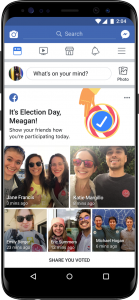The science of speaking up: Behavioral science & election day
The Midterms are coming. Have you heard? Between social media, TV ads, intrusive campaign text messages, and public transit leafleting, you’d have to live under a rock to not know about Tuesday’s Midterm elections and the highly-charged politics of what’s at stake on either side of the aisle this November.
At Humu HQ, we don’t all agree on everything, but we do all agree on one thing: hitting the polls is number one on each of our to-do lists for Tuesday—regardless of politics.
And as big believers in the efficacy of nudges, or micro-interventions, we’re fascinated by the growing number of behavioral science principles at play in driving democracy these days.Here are a few of the most common you’ll see in the wild this week—and the psychological tactics at work under the surface.

Social proof
Facebook’s get-out-the-vote efforts use a classic lever of behavioral science known as social influence: when we see that our friends have done something, we want to do it too. When users click the “I Voted” button to display that information in their news feed, a lot more people turn up at the polls. As long as the feature shows up evenly across populations on Facebook, this is an excellent tactic—and social good—from the company to get people to vote.That said, the feature also raises the potential for an ethical minefield if used for less-than-democratic means. As Facebook holds information on users that can accurately predict political affiliation, the platform has the power to significantly shift voter turnout by turning the feature on (or off) along party lines.

Status signaling
Like Facebook’s signal of social proof, the physical “I Voted” sticker you pick up at the polls sends a ripple of encouragement through the people you see over the course of the day. But there’s a secondary lever being pulled. Yes, stickers increase voter turnout in your wake—but they also make youfeel good. It’s a tiny reward for your behavior and it also signals status: “I’ve done my civic duty today.” These good vibes significantly increase your likelihood to talk about voting, and encourage others to do the same. It’s a behavioral science double-whammy.
Commitment devices

Lately, my phone has been blowing up. “Hi, Jessie. This is Gavin Newsom. Can I count on your vote this Tuesday?” Personally, I don’t reply to them—but this is another two-for-one that can significantly influence voting behavior.
Firstly when folks do respond to these queries, the information is considered to be more reliable than traditional polling data, as more individuals from more diverse populations can be reached directly—and their responses quantified. It can help campaigns know where resources need to be deployed to garner votes, as well as populations whose votes can be counted on with little extra work.
But the real magic of these kinds of commitments is psychological. When you make a commitment to vote (or to vote a certain way)—particularly when that commitment is made public, or shared with another person—you’re more likely to follow through with your intended behavior. Numerous studies agree that, once you’ve committed, you’re far more likely to stick to that decision, or risk personal discomfort. This is because backing out of a commitment (even a low stakes, non-binding one!) causes personal discomfort; it turns out we don’t like to disappoint ourselves. The Humu team is doing our part to turn out the vote on Tuesday through volunteering, phone-banking, driving folks to the polls, and—for some of us—helping first-generation family members vote for the first time. In a democracy, voting is both a privilege and a responsibility. We want each of our Humuns—and each of you!—to make your voice heard as well. Nudge, nudge!
To learn more about how Humu uses nudges to drive positive behavioral change in the workplace, sign up for our newsletter—or if you're interested in bringing Humu to your workplace—request a demo!




.png)

